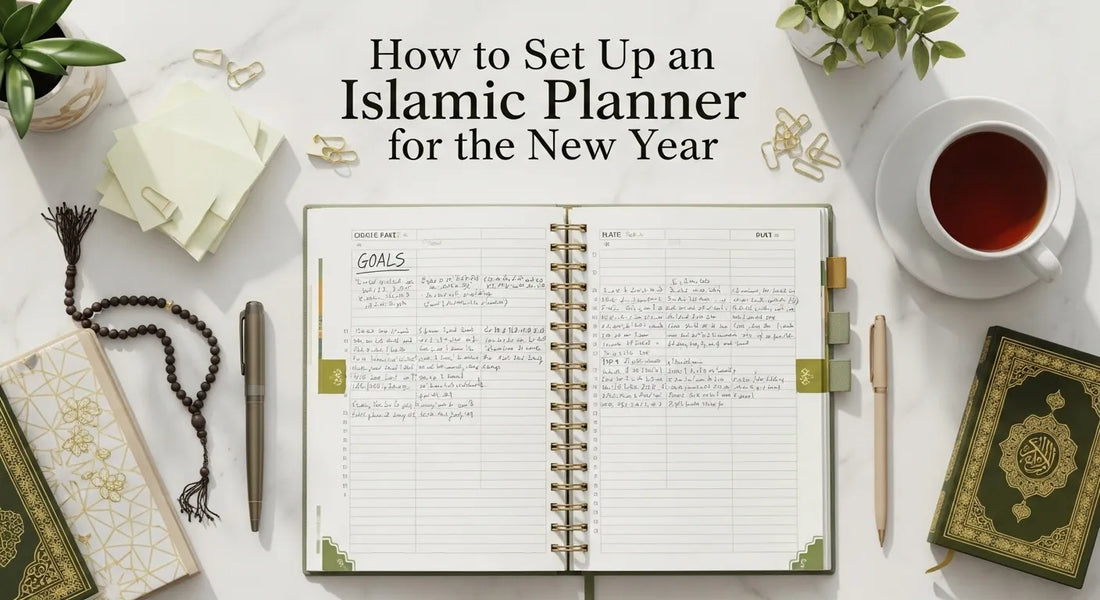
How to Set Up an Islamic Planner for the New Year
Share
Introduction
A new year is an opportunity to renew intentions, realign priorities, and bring more barakah into your life. As Muslims, planning is not just about productivity. It is about living with purpose, making time for worship, and ensuring our days reflect our faith.
Using an Islamic planner helps you plan your days around salah, dhikr, Quran, family, and meaningful work. This guide walks you through how to set up your Islamic planner for the new year so you can build a balanced, consistent, and spiritually fulfilling life.
1. Begin with a Clear Intention (Niyyah)
Before writing anything, begin with intention. Planning with sincerity turns daily tasks into worship.
Ask yourself:
- Why do I want to plan my year?
- What kind of Muslim do I want to become?
-
How can my daily routine bring me closer to Allah?
Write your intention at the front of your planner as a reminder throughout the year.
2. Reflect on the Past Year

Reflection builds self-awareness and helps identify areas of improvement.
Use journal prompts:
- What did I improve spiritually?
- Which habits weakened?
- What duas were answered?
-
Where did I lose focus?
Reflection strengthens gratitude and guides realistic planning.
For deep monthly reflection ideas, see:
https://muslimplanner.com/blogs/islamic-productivity/islamic-planner-with-prayer-tracker
3. Set Your New Year Goals (Deen + Dunya)
Balance your goals:
Spiritual Goals
Examples:
- Finish the Quran twice
- Pray Tahajjud twice weekly
- Memorize 12 new surahs
- Attend weekly halaqah
Personal & Family Goals
Examples:
- Daily 10-page reading
- Weekly family Islamic reminder circle
-
Strengthen morning routine
For career-focused routines, read:
https://muslimplanner.com/blogs/islamic-productivity/muslim-career-planning
4. Create a Worship Routine
Your planner should revolve around Salah and Ibadah first.

Set daily and weekly systems:
- Salah tracker
- Quran study time
- Dhikr checklist
- Sunnah practice list
-
Friday routine plan
For US work-schedule prayer tips, reference:
https://muslimplanner.com/blogs/islamic-productivity/american-muslim-work-schedule-prayer-times
5. Build Your Dua and Gratitude Section
Use your Islamic planner to:
-
Record daily duas
-
Track answered duas
-
Write gratitude every evening
See our dua tracking guide:
https://muslimplanner.com/blogs/islamic-productivity/dua-planner-with-tracker
This practice increases mindfulness and builds tawakkul.
6. Use Habit Tracking for Consistency
![]()
Track habits like:
- Fajr on time
- Quran after Fajr
- Morning adhkar
- Evening adhkar
- Charity
-
Journaling
Daily consistency beats yearly ambition.
Explore more here:
https://muslimplanner.com/blogs/islamic-productivity/islamic-habit-tracker
7. Monthly and Weekly Layout Setup
Monthly Setup
- Key ibadah goals
- Key personal goals
- Family milestones
- Islamic dates
-
Budget and charity plan
Weekly Setup
- Salah record
- Quran target
- Top duas
-
Time-blocking work & ibadah
Want Ramadan-ready planning? See:
https://muslimplanner.com/blogs/islamic-productivity/complete-ramadan-planning-guide
8. Add Seasonal Islamic Planning

Include planning sections for:
- Ramadan
- Dhul-Hijjah
- Islamic milestones
- Charity projects
-
Eid gifts & prayer prep
9. Keep Your System Simple and Sustainable
Avoid over-planning. Focus on:
- Two daily spiritual goals
- One big daily task
-
Small consistent habits
Remember the Sunnah: consistency is better than intensity.
Your planner is not just a productivity tool. It is a companion on your journey to live a more purposeful, conscious, and spiritually grounded life.
Start your new year with clarity, dua, and discipline.
Explore the full collection and choose your Islamic planner here:
https://muslimplanner.com/products/muslim-planner
FAQs
What should I write in an Islamic planner?
Write prayers, spiritual goals, Quran progress, duas, habits, gratitude, and daily priorities centered around Salah.
How do I stay consistent with my Islamic planner?
Review daily after Fajr or Isha, set small goals, track habits, and reflect weekly.
Why use an Islamic planner instead of a normal planner?
It helps align deen and dunya, includes worship tracking, and builds routines based on Islamic values—not just tasks.


